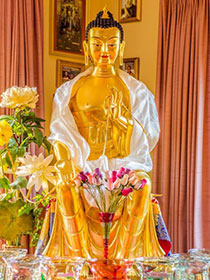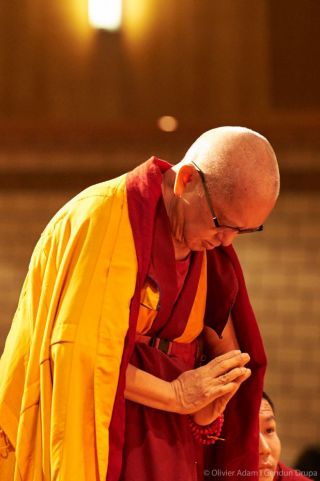- Home
- FPMT Homepage
Foundation for the Preservation of the Mahayana Tradition
The FPMT is an organization devoted to preserving and spreading Mahayana Buddhism worldwide by creating opportunities to listen, reflect, meditate, practice and actualize the unmistaken teachings of the Buddha and based on that experience spreading the Dharma to sentient beings. We provide integrated education through which people’s minds and hearts can be transformed into their highest potential for the benefit of others, inspired by an attitude of universal responsibility and service. We are committed to creating harmonious environments and helping all beings develop their full potential of infinite wisdom and compassion. Our organization is based on the Buddhist tradition of Lama Tsongkhapa of Tibet as taught to us by our founders Lama Thubten Yeshe and Lama Thubten Zopa Rinpoche.
- Willkommen
Die Stiftung zur Erhaltung der Mahayana Tradition (FPMT) ist eine Organisation, die sich weltweit für die Erhaltung und Verbreitung des Mahayana-Buddhismus einsetzt, indem sie Möglichkeiten schafft, den makellosen Lehren des Buddha zuzuhören, über sie zur reflektieren und zu meditieren und auf der Grundlage dieser Erfahrung das Dharma unter den Lebewesen zu verbreiten.
Wir bieten integrierte Schulungswege an, durch denen der Geist und das Herz der Menschen in ihr höchstes Potential verwandelt werden zum Wohl der anderen – inspiriert durch eine Haltung der universellen Verantwortung und dem Wunsch zu dienen. Wir haben uns verpflichtet, harmonische Umgebungen zu schaffen und allen Wesen zu helfen, ihr volles Potenzial unendlicher Weisheit und grenzenlosen Mitgefühls zu verwirklichen.
Unsere Organisation basiert auf der buddhistischen Tradition von Lama Tsongkhapa von Tibet, so wie sie uns von unseren Gründern Lama Thubten Yeshe und Lama Thubten Zopa Rinpoche gelehrt wird.
- Bienvenidos
La Fundación para la preservación de la tradición Mahayana (FPMT) es una organización que se dedica a preservar y difundir el budismo Mahayana en todo el mundo, creando oportunidades para escuchar, reflexionar, meditar, practicar y actualizar las enseñanzas inconfundibles de Buda y en base a esa experiencia difundir el Dharma a los seres.
Proporcionamos una educación integrada a través de la cual las mentes y los corazones de las personas se pueden transformar en su mayor potencial para el beneficio de los demás, inspirados por una actitud de responsabilidad y servicio universales. Estamos comprometidos a crear ambientes armoniosos y ayudar a todos los seres a desarrollar todo su potencial de infinita sabiduría y compasión.
Nuestra organización se basa en la tradición budista de Lama Tsongkhapa del Tíbet como nos lo enseñaron nuestros fundadores Lama Thubten Yeshe y Lama Zopa Rinpoche.
A continuación puede ver una lista de los centros y sus páginas web en su lengua preferida.
- Bienvenue
L’organisation de la FPMT a pour vocation la préservation et la diffusion du bouddhisme du mahayana dans le monde entier. Elle offre l’opportunité d’écouter, de réfléchir, de méditer, de pratiquer et de réaliser les enseignements excellents du Bouddha, pour ensuite transmettre le Dharma à tous les êtres. Nous proposons une formation intégrée grâce à laquelle le cœur et l’esprit de chacun peuvent accomplir leur potentiel le plus élevé pour le bien d’autrui, inspirés par le sens du service et une responsabilité universelle. Nous nous engageons à créer un environnement harmonieux et à aider tous les êtres à épanouir leur potentiel illimité de compassion et de sagesse. Notre organisation s’appuie sur la tradition guéloukpa de Lama Tsongkhapa du Tibet, telle qu’elle a été enseignée par nos fondateurs Lama Thoubtèn Yéshé et Lama Zopa Rinpoché.
Visitez le site de notre Editions Mahayana pour les traductions, conseils et nouvelles du Bureau international en français.
Voici une liste de centres et de leurs sites dans votre langue préférée
- Benvenuto
L’FPMT è un organizzazione il cui scopo è preservare e diffondere il Buddhismo Mahayana nel mondo, creando occasioni di ascolto, riflessione, meditazione e pratica dei perfetti insegnamenti del Buddha, al fine di attualizzare e diffondere il Dharma fra tutti gli esseri senzienti.
Offriamo un’educazione integrata, che può trasformare la mente e i cuori delle persone nel loro massimo potenziale, per il beneficio di tutti gli esseri, ispirati da un’attitudine di responsabilità universale e di servizio.
Il nostro obiettivo è quello di creare contesti armoniosi e aiutare tutti gli esseri a sviluppare in modo completo le proprie potenzialità di infinita saggezza e compassione.
La nostra organizzazione si basa sulla tradizione buddhista di Lama Tsongkhapa del Tibet, così come ci è stata insegnata dai nostri fondatori Lama Thubten Yeshe e Lama Zopa Rinpoche.
Di seguito potete trovare un elenco dei centri e dei loro siti nella lingua da voi prescelta.
- 欢迎 / 歡迎
简体中文
“护持大乘法脉基金会”( 英文简称:FPMT。全名:Foundation for the Preservation of the Mahayana Tradition) 是一个致力于护持和弘扬大乘佛法的国际佛教组织。我们提供听闻,思维,禅修,修行和实证佛陀无误教法的机会,以便让一切众生都能够享受佛法的指引和滋润。
我们全力创造和谐融洽的环境, 为人们提供解行并重的完整佛法教育,以便启发内在的环宇悲心及责任心,并开发内心所蕴藏的巨大潜能 — 无限的智慧与悲心 — 以便利益和服务一切有情。
FPMT的创办人是图腾耶喜喇嘛和喇嘛梭巴仁波切。我们所修习的是由两位上师所教导的,西藏喀巴大师的佛法传承。
繁體中文
護持大乘法脈基金會”( 英文簡稱:FPMT。全名:Found
ation for the Preservation of the Mahayana Tradition ) 是一個致力於護持和弘揚大乘佛法的國際佛教組織。我們提供聽聞, 思維,禪修,修行和實證佛陀無誤教法的機會,以便讓一切眾生都能 夠享受佛法的指引和滋潤。 我們全力創造和諧融洽的環境,
為人們提供解行並重的完整佛法教育,以便啟發內在的環宇悲心及責 任心,並開發內心所蘊藏的巨大潛能 — 無限的智慧與悲心 – – 以便利益和服務一切有情。 FPMT的創辦人是圖騰耶喜喇嘛和喇嘛梭巴仁波切。
我們所修習的是由兩位上師所教導的,西藏喀巴大師的佛法傳承。 察看道场信息:
- FPMT Homepage
- News/Media
-
- Study & Practice
-
-
- About FPMT Education Services
- Latest News
- Programs
- New to Buddhism?
- Buddhist Mind Science: Activating Your Potential
- Heart Advice for Death and Dying
- Discovering Buddhism
- Living in the Path
- Exploring Buddhism
- FPMT Basic Program
- FPMT Masters Program
- FPMT In-Depth Meditation Training
- Maitripa College
- Lotsawa Rinchen Zangpo Translator Program
- Universal Education for Compassion & Wisdom
- Online Learning Center
-
- Prayers & Practice Materials
- Overview of Prayers & Practices
- Full Catalogue of Prayers & Practice Materials
- Explore Popular Topics
- Benefiting Animals
- Chenrezig Resources
- Death & Dying Resources
- Lama Chopa (Guru Puja)
- Lama Zopa Rinpoche: Compendium of Precious Instructions
- Lama Zopa Rinpoche: Life Practice Advice
- Lama Zopa Rinpoche Practice Series
- Lamrim Resources
- Mantras
- Prayer Book Updates
- Purification Practices
- Sutras
- Thought Transformation (Lojong)
- Audio Materials
- Dharma Dates - Tibetan Calendar
- Translation Services
- Publishing Services
- Ways to Offer Support
- Prayers & Practice Materials
-
- Teachings and Advice
- Find Teachings and Advice
- Lama Zopa Rinpoche Advice Page
- Lama Zopa Rinpoche: Compendium of Precious Instructions
- Lama Zopa Rinpoche Video Teachings
- ༧སྐྱབས་རྗེ་བཟོད་པ་རིན་པོ་ཆེ་མཆོག་ནས་སྩལ་བའི་བཀའ་སློབ་བརྙན་འཕྲིན།
- Podcasts
- Lama Yeshe Wisdom Archive
- Buddhism FAQ
- Dharma for Young People
- Resources on Holy Objects
- Teachings and Advice
-
-
*If a menu item has a submenu clicking once will expand the menu clicking twice will open the page.
-
-
- Centers
-
- Teachers
-
- Projects
-
-
-
-
*If a menu item has a submenu clicking once will expand the menu clicking twice will open the page.
-
-
- FPMT
-
-
-
-
-
Every second of this human life is more precious than skies of wish-granting jewels.
Lama Zopa Rinpoche
-
-
-
- Shop
-
-
-
The Foundation Store is FPMT’s online shop and features a vast selection of Buddhist study and practice materials written or recommended by our lineage gurus. These items include homestudy programs, prayers and practices in PDF or eBook format, materials for children, and other resources to support practitioners.
Items displayed in the shop are made available for Dharma practice and educational purposes, and never for the purpose of profiting from their sale. Please read FPMT Foundation Store Policy Regarding Dharma Items for more information.
-
-
Lama Zopa Rinpoche News and Advice
12
Advice for Merit Multiplying Days
Lama Zopa Rinpoche gave advice regarding merit multiplying days such as the Fifteen Days of Miracles, Saka Dawa, Chokhor Duchen, and Lhabab Duchen. The next merit multiplying day is Saka Dawa on June 17, 2019.
On the day of Guru Shakyamuni Buddha’s turning the Wheel of Dharma, if you do one prostration while reciting the names of the Thirty-Five Buddhas, it becomes equal to having done 100 million prostrations while reciting the names of the Thirty-Five Buddhas. If you recite one Vajrasattva mantra, it becomes the same as having done the Vajrasattva mantra 100 million times. If you recite the Diamond Cutter Sutra (Vajra Cutter Sutra) one time, it becomes the same as having recited the Diamond Cutter Sutra 100 million times—so that much purification and you collect that many merits to quickly be free from samsara, and if the practices are done with bodhichitta, then to quickly achieve enlightenment.
Reading the Golden Light Sutra (Sutra of Golden Light), besides the personal benefits that creates, also brings so much peace in the world, for the Buddhadharma to last a long time, which means more sentient beings being able to meet the Dharma and to achieve enlightenment. Then, also reciting the Arya Sanghata Sutra, which brings success, including enlightenment. Each recitation becomes 100 million recitations—so please tell your parents and friends this.
This is the best way to help your parents and this really helps your parents. You can tell others this also and their friends. This really helps the world, to make a better world.
Please read my notes well. Don’t rush. Think about each word.
Also on these days, you can do tonglen—taking others sufferings and giving away one’s own happiness—then, also rejoicing. You can meditate on dependent arising (meaning, emptiness only) and develop bodhichitta. Of course, you can do self-initiation during this very special time according to the time in India.
If you want to know which lama and which text mentioned this, it was His Holiness the Dalai Lama’s and His Eminence Sakya Trizin’s guru—Chobgye Trichen Rinpoche. Rinpoche referred to Guru Shakyamuni Buddha’s teaching Dulwa Lung (‘dul ba lung) as saying that the number the merit multiplies by is 100 million. It is a great advantage to practice during these times; like for myself, who is the most extremely laziest person in this world.
Another very important practice to do on these days is taking the eight Mahayana precepts for one day until the next day at sunrise. That doesn’t mean necessarily until sunrise Indian time. It means sunrise at the place where you are; up until dawn, when the sun rises in your part of the world.
In case there are difficulties to keeping all eight precepts, perhaps due to work, for example, you can take the rest of the vows well. Taking the eight Mahayana precepts is so beneficial for world peace, for crops to grow well, to receive timely rains—all this is needed to make the world better. Then, there are incredible benefits for yourself. This is explained in the book of the eight Mahayana precepts. This is so important for your own life to be better and to make the world better, to bring benefit.
Written by Lama Zopa Rinpoche, August 2017, United States. Edited by Michael D. Jolliffe for publication on FPMT.org.
Lama Zopa Rinpoche is the spiritual director of the Foundation for the Preservation of Mahayana Tradition (FPMT), a Tibetan Buddhist organization dedicated to the transmission of the Mahayana Buddhist tradition and values worldwide through teaching, meditation, and community service.
- Tagged: buddha day, merit multiplying day
11
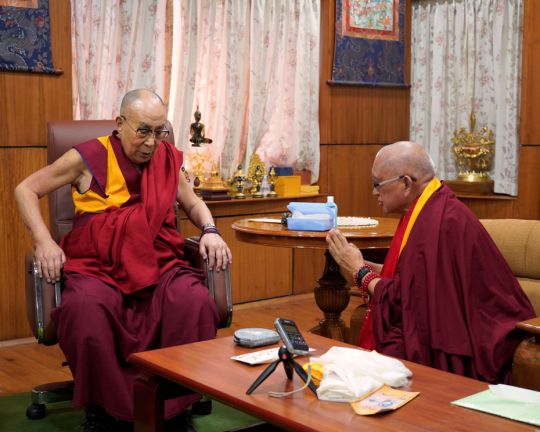
His Holiness the Dalai Lama with Lama Zopa Rinpoche during a presentation on the activities of FPMT, Dharamsala, India, August 2018. Photo courtesy of the Office of His Holiness the Dalai Lama.
Earlier this week His Holiness the Dalai Lama was admitted to hospital in New Delhi, India, suffering from what seems to be a chest infection.
Tenzin Osel Hita, the recognized reincarnation of FPMT co-founder Lama Yeshe, sent a message to Lama Zopa Rinpoche, FPMT co-founder and spiritual director, asking if prayers or pujas could be done by all the FPMT centers for His Holiness, with some suggested practices.
Lama Zopa Rinpoche checked and is advising all FPMT centers, projects, and services to please make tsog offerings, requesting for His Holiness’s long life and for His Holiness to be free of the present illness, and also to make tsog offerings to purify our own degenerated vows and samaya, and to hook realizations.
In addition, Rinpoche advises to please liberate animals.
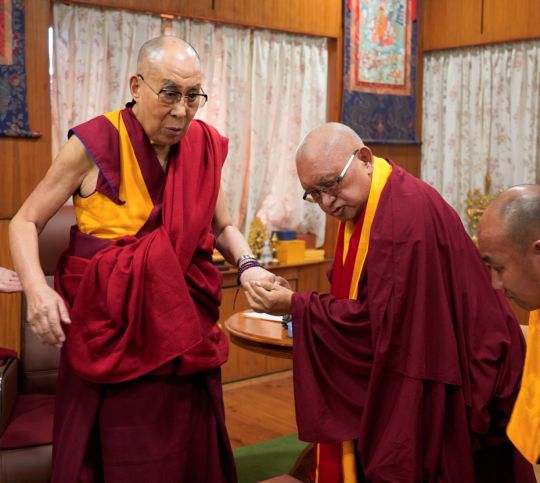
His Holiness the Dalai Lama with Lama Zopa Rinpoche, Dharamsala, India, August 2018. Photo courtesy of the Office of His Holiness the Dalai Lama.
Find Rinpoche’s advice Liberating Animals from the Danger of Death here:
https://fpmt.org/wp-content/uploads/teachers/zopa/advice/pdf/liberating_animals_c5.pdf
The FPMT Foundation Store also offers the Animal Liberation Tools:
https://shop.fpmt.org/Animal-Liberation-Tools-PDF_p_3166.html
Lama Zopa Rinpoche is the spiritual director of the Foundation for the Preservation of Mahayana Tradition (FPMT), a Tibetan Buddhist organization dedicated to the transmission of the Mahayana Buddhist tradition and values worldwide through teaching, meditation and community service.
8
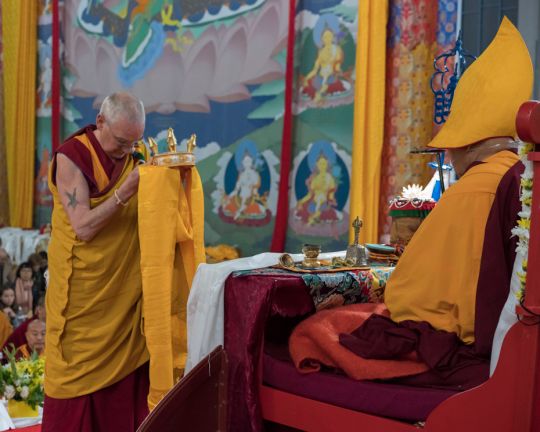
Ven. Roger Kunsang offering a mandala to Lama Zopa Rinpoche during the long life puja concluding the retreat at the Great Stupa of Universal Compassion, Australia, May 2018. Photo by Ven. Lobsang Sherab.
During the 2018 retreat at the Great Stupa of Universal Compassion in Australia, Lama Zopa Rinpoche taught extensively on guru devotion. In the following, Rinpoche shares examples of quotes on guru devotion and concludes the half-hour video clip with a discussion of the proper motivation for listening to teachings.
In the tantric text Yeshe Gyatso, Oceans of Transcendental Wisdom, it says:
YÖN TEN THAM CHÄ RAB DZOG KYANG
Even if all qualities are completed,
LA MA ME PÄ SI THAR MIN
Without a guru you cannot be liberated from samsara.
“Even if all the qualities are completed, but without a guru you can’t be liberated from samsara.” So even if you know by heart all the Kangyur and Tengyur, you can explain them by heart, but without a guru .…
It is possible that many people who don’t know lamrim—who don’t know the essence of Dharma, lamrim, how to actualize the path to enlightenment, who do not know—would think like this. I think in particular many Westerners might think like that. They don’t understand about the guru. There are many people who think like that: you can do it without a guru.
There it says in the tantric text:
YÖN TEN THAM CHÄ RAB DZOG KYANG
Even if all qualities are completed,
LA MA ME PÄ SI THAR MIN
Without a guru you cannot be liberated from samsara.
There is a quote from Array of Stalks Sutra:
KYA WA DZIN PA ME PAR NI
Without the oarsman,
DRU YI PHA RÖL CHIN MI NÜ
A boat cannot cross the river.
LA MA ME PÄI GONG RÖL NA
Before the guru
SANG GYÄ ZHE JÄI MING YANG ME
There is not even the name “buddha.”
KYA WA, the wood [oar]; KYA WA DZIN PA ME PA is “without a captain, the one holding that [oar].” “Without a captain, the boat alone cannot cross a river.” “Without an oarsman, the boat cannot cross the river.” You understand? That example is given.
LA MA ME PÄI GONG RÖL NA / SANG GYÄ ZHE JÄI MING YANG ME: “Before the guru, there is no buddha, there is no name even ‘buddha.’” All the buddhas come from the guru. This is what the Buddha’s quotation shows.
Therefore, one must cherish—hold on to the guru as more precious, more kind than the buddhas, than the ten-direction buddhas, the three-time buddhas, the numberless past, present, and future buddhas, all the numberless buddhas.
The practice is—it is not praising myself because I am called guru, I’m not praising myself—but how we should practice. I’m talking about that. So therefore, the most important mindful practice, meditation, is correctly following the virtuous friend with thought and action, not just devotion, only one thing, leaving out all the actions—with thought and action, you have to remember that, the nine attitudes, all those actions you have to understand. …
Watch the teaching by Lama Zopa Rinpoche from which the above excerpt is taken:
https://youtu.be/H2ViliSrTX0
Colophon: Excerpted from Lama Zopa Rinpoche’s teachings at the Great Stupa of Universal Compassion, Bendigo, Victoria, Australia, April 6, 2018. Simultaneously transcribed by Ven. Joan Nicell. Lightly edited by Laura Miller, March 2019.
Find complete videos of Lama Zopa Rinpoche’s recent teachings:
https://fpmt.org/media/streaming/teachings-of-lama-zopa-rinpoche/
Lama Zopa Rinpoche is the spiritual director of the Foundation for the Preservation of Mahayana Tradition (FPMT), a Tibetan Buddhist organization dedicated to the transmission of the Mahayana Buddhist tradition and values worldwide through teaching, meditation and community service.
- Tagged: essential extract, guru, guru devotion, lama zopa rinpoche, practice, video
5
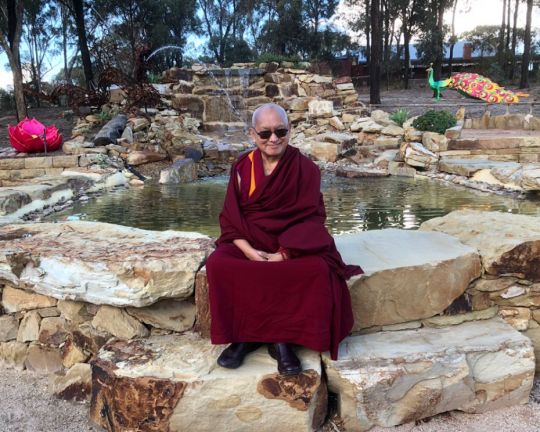
Lama Zopa Rinpoche in the Peace Park at the Great Stupa of Universal Compassion, Bendigo, Australia, May 2018. Photo by Ven. Roger Kunsang.
The FPMT Annual Review 2018 featured a letter from Lama Zopa Rinpoche, advising on the benefits of serving the guru. Here’s an excerpt from Rinpoche’s letter:
My most dear, most kind, most precious, wish-fulfilling ones,
From the bottom of my heart, thank you all numberless times for all your service, dedication, practice of holy Dharma with your body, speech, and mind, and for your devotion and good heart.
Here I wanted to give you this advice:
Lama Tsongkhapa said:
By correctly serving the guru, the virtuous friend,
The karma one has to experience in the evil gone realms,
Instead one experiences as a small harm to the body and mind in this life,
Or even in a dream and in this way the karma finishes.
This means that the heavy karma that otherwise would have resulted in you being born in the lower realms, for so many eons, it all gets finished by serving the guru.
Also it is mentioned in Kshitigarbha Sutra:
By correctly following the virtuous friend,
The karma to wander in the evil gone realms for an unfathomable amount of time (ten million eons),
As well as in this life to experience harm to the body and mind,
Such as epidemics, contagious disease, famines, and so forth,
All this gets totally purified by receiving a scolding, being teased, or even just having a dream.
This means all those heavy negative karmas would have otherwise resulted in wandering in the evil gone realms for an unfathomable amount of time.
What happens if you are not aware of the most unbelievable benefits of correctly following the virtuous friend? If you are not aware and not thinking, then you think it is very bad, you regard it as very bad. But by recognizing and knowing these points then you understand that it is the most incredible purification and way of collecting merits and actualizing the path. It makes it so easy to actualize the path and to achieve enlightenment easily and quickly. This is something to rejoice in and to feel incredible happiness about.
One’s whole practice is serving the guru. Whether following advice; doing commitments; making offerings of flowers, water, lights, incense, which are done with so much devotion and respect to the Triple Gem; offering one’s own time and practice, so every single thing that you do is service; then also offering other service such as being director, co-director, coordinator, spiritual program coordinator, bookkeeper, office person, cleaner, translator, book editors, and so forth, past and present—everything that you do is offering service.
By pleasing the guru, this pleases all the buddhas. You have to remember this everyday. That is what you are doing—day and night, every single thing that you do. It is so unbelievable. What more is there to do? It is unbelievable. You can rejoice in the skies of merits. …
Colophon: Scribe Holly Ansett, Buddha Amitabha Pure Land, Washington, US, August 2018. Lightly edited for inclusion in the FPMT Annual Review 2018.
Read Rinpoche’s entire letter in the FPMT Annual Review 2018: Live with Compassion*:
https://fpmt.org/fpmt/annual-review/
*The FPMT Annual Review 2018 is available in digital format only, meaning it will not be printed and posted to FPMT centers, projects, and services.
Lama Zopa Rinpoche is the spiritual director of the Foundation for the Preservation of Mahayana Tradition (FPMT), a Tibetan Buddhist organization dedicated to the transmission of the Mahayana Buddhist tradition and values worldwide through teaching, meditation and community service.
- Tagged: annual review, guru devotion, lama zopa rinpoche
1
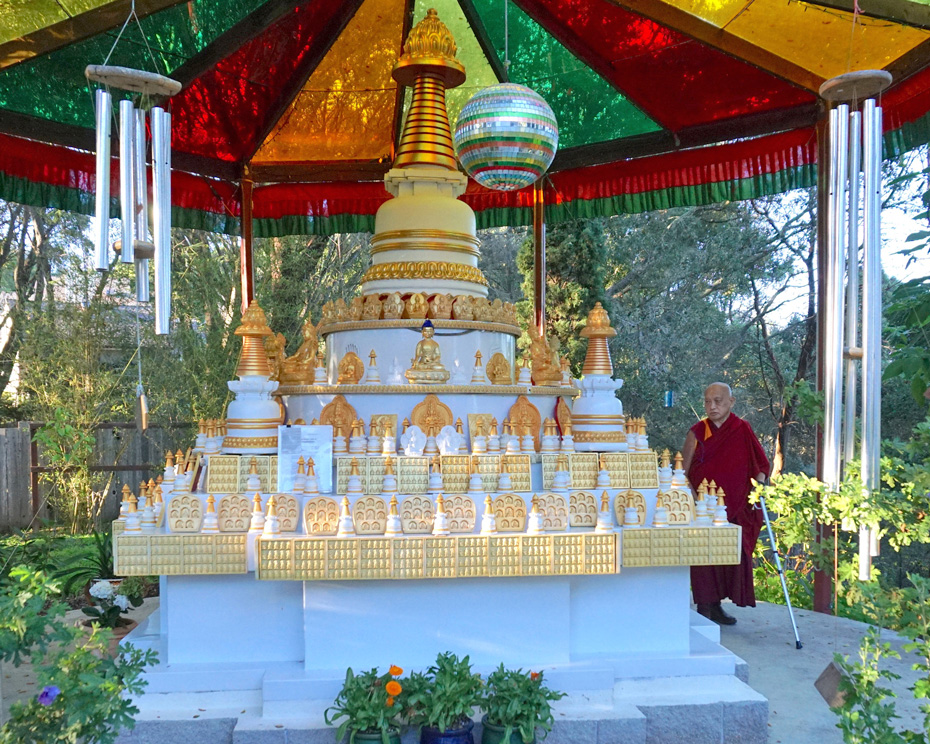
Lama Zopa Rinpoche circumambulating stupas and tsa-tsas at Kachoe Dechen Ling, Aptos, California, US, November 2016. Photo by Ven. Lobsang Sherab.
Lama Zopa Rinpoche gave this advice to a student who said they had a new stupa in their house.
My most dear, most kind, most precious, wish-fulfilling one,
As this stupa was filled at Amitabha Buddha Centre (ABC), then it will have the Four Dharmakaya Relic Mantras inside.
This is a Kadampa stupa, like what Lama Atisha used to carry, keeping the Guru’s hair, robes, and relics inside. When Atisha was on the road, even if a very subtle vice had been committed, he would immediately prostrate to the stupa and confess. This was how he used the stupa, for that purpose.
Here I want to say this: you don’t have to put this stupa on your altar. Many times people don’t even look at the altar. So here, it is so important to see the stupa. Each time you see it there is great, great purification and that brings you to enlightenment; this is just by looking at the stupa.
Therefore, it is better to put it in the kitchen or living room or on a table. If you have many stupas then you can put them on a table and also put other Buddha statues and texts (sutras such as the Vajra Cutter Sutra, Golden Light Sutra, Aryasangata Sutra, and so forth) then you can go around all these holy objects that are on the table. It makes it so easy to circumambulate them.
This is a great thing. It purifies negative karma collected from beginningless rebirths that are obstacles to happiness—temporary and ultimate happiness—and especially to actualizing all the realizations on the path to enlightenment. And it creates the cause to achieve the path to enlightenment—to actualize the teachings that you have heard and read in your heart.
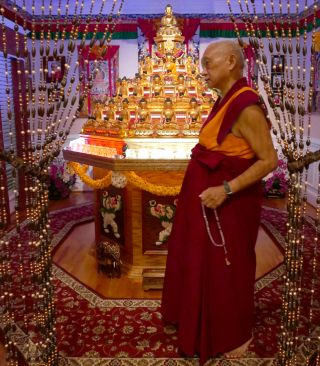
Rinpoche circumambulating stupas and tsa-tsas at students’ home in North Darolina, August 2016. Photo by Ven. Roger Kunsang.
People who are non-believers can also go around the table with this stupa (and if you have them, other holy objects) on it while you are having a conversation with them. In this way even if your speech is non-virtuous, you can still collect unbelievable virtue with your body. And the non-believers also create the cause of enlightenment. There is great purification, and also one is able to collect merits.
It is like the example of Jinpa Palgye (Shrijata). This is a story from the sutras. A long time ago he was a fly who followed the smell of cow dung around a stupa. That action became the cause in his life—when he was eighty years old—to begin to practice Dharma. He achieved renunciation from samsara. And by becoming free from samsara, he achieved the level of Arhat, free from samsara and the causes of samsara—delusion and karma.
Not only non-believers, even when people from outside visit your house, they can also go around. If you have pets, such as dogs and cats, you can also bring them around the stupa that is on the table by holding them in your hands if you can, so they are at the same level as the stupa.
Also if you find worms, insects, or flies in the house, or ants on your body—basically any insect that you find—you can catch them and put them in a plastic bag. Here at ABC they kindly made these insect catchers, which are two small boxes. One is called “method,” and the other is called “wisdom.” So you can put the insect in those, then take them around the stupa a few times, and then release them in a safe place.
Or if you have a thousand ants or crickets in a plastic bag, then you can take them all around the stupa. This plants the seed of enlightenment in all their hearts, and there is great purification of heavy negative karma that has been collected from beginningless rebirths. Also they collect extensive merits.
This is the best present from your side that you can offer them, as they are the cause of all your happiness from beginningless rebirths until now and also in the future. Every single happiness you receive from them. Beside that, they have been kind to you from beginningless rebirths. They have created so much negative karma in order to take care of you. They have suffered unbelievably, unbelievably, unbelievably for you and will do so again in the future, until you are free from samsara.
Therefore, it is so important to be free from samsara as quickly as possible by actualizing wisdom directly perceiving emptiness. So for that you need calm abiding. For that you need pure morality, the three higher trainings, not only if you are ordained but also as a lay practitioner.
Having the Four Dharmakaya Relic Mantras inside the stupa means it also has the Secret Relic Mantra inside. So if you go around the stupa with this mantra inside just one time, it purifies all the heavy negative karmas to be born in the hot hells, down to the eighth hot hell, the unbearable hell realm that has the heaviest suffering. All this gets purified and it makes it so easy to be born in a pure land or to achieve a perfect human rebirth with the eight freedoms and ten endowments, so one has the freedom to practice Dharma and to achieve enlightenment.
When you go around the stupa you can recite OM MANI PADME HUM or other mantras, or if you have some commitments then you can recite them. Because if you sit down to pray then you go to sleep, but when you try to go to sleep, then you are fully awake, but not necessary fully awake in Dharma.
One time in Kachoe Dechen Ling in California, our very precious kind Fabrizio [Pallotti] was in the same area and he was talking to me a long time on the phone. I was in my room and in that room I have a table that has many stupas, prayer wheels, statues, texts, relics, and images of buddhas on it. The table is similar to the altar tables I have in my room in Kopan and also in Dharamsala. The table is round and quite high and has many holy objects on it at a few different levels. You can go around the table. So as I was on the phone I thought to make the time worthwhile while I was talking, so I went around the table with all the holy objects. In this way at least I can collect merit and purify the cause of the lower realms and create the cause to be free from samsara, and also lower nirvana and achieve great enlightenment. By going around the holy objects, at least with the body, one can create virtue and the cause of enlightenment.
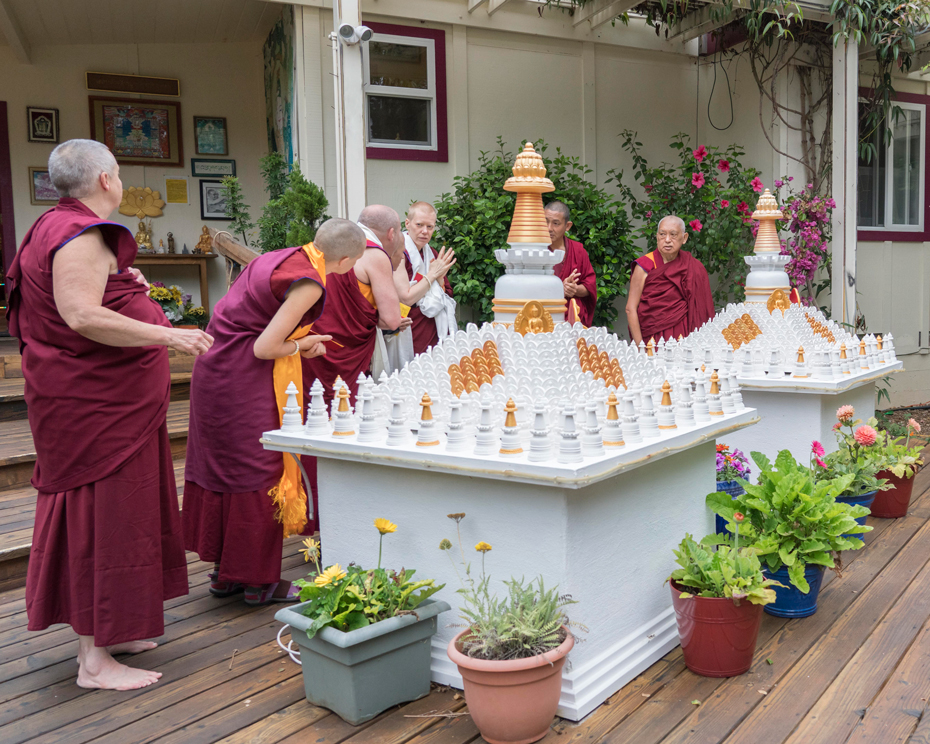
Rinpoche with Sangha next to stupas and tsa-tsas at Kachoe Dechen Ling, Aptos, California, US, August 2018. Photo by Ven. Lobsang Sherab.
Also outside the office at Kachoe Dechen Ling there is a table set up with many Kadampa stupas and tsa-tsas,and a bigger stupa in the center. It is very neatly set up. So while Roger [Kunsang] and Holly [Ansett] are talking on the phone, which happens a lot, then at least they can go around and make the action of the body virtuous and create the cause of enlightenment.
If you put this stupa on the dining room or living room table, it makes it very easy for people to go around every day, many people, so many times a day. It is so good to go around. So then you can rejoice at the end of the day, that at least there was some virtuous action collected. Then as many people spend a long time on the phone, while they are on the phone, they can go around the stupa. So it helps very much to not waste this most precious human rebirth.
You can look at some photos of how I have set up the different stupas at Kachoe Dechen Ling. Also there is one Vietnamese family in North Carolina who has made a thousand Buddha statues, and they made an altar for the statues with many different colored lights. They go around every day, and also even their children go around by themselves as well.
So because we have this perfect human rebirth—it is just one time, it is not sure how long we will have it, life is very short—I am suggesting this so as to not waste your most precious human life, which is more precious that the whole sky filled with wish-granting jewels, not only diamonds. Thank you very much.
With much love and prayers,
Lama Zopa
P.S. Please read and look at the stupas here:
https://fpmt.org/media/newsletters/archives/lama-zopa-rinpoche-news-december-2004/#4
Colophon: Scribed by Ven. Holly Ansett, Kachoe Dechen Ling, Aptos, California, US, October 14, 2015. Lightly edited by Laura Miller, March 2019.
For more on stupas and their benefits, see FPMT Education’s “Stupas: A Resource Guide”:
https://fpmt.org/education/practice/holy-objects/stupas-resources/
Find more advice from Lama Zopa Rinpoche:
https://fpmt.org/teachers/zopa/advice/
Lama Zopa Rinpoche is the spiritual director of the Foundation for the Preservation of Mahayana Tradition (FPMT), a Tibetan Buddhist organization dedicated to the transmission of the Mahayana Buddhist tradition and values worldwide through teaching, meditation and community service.
- Tagged: advice from lama zopa rinpoche, circumambulation, kachoe dechen ling, lama zopa rinpoche, stupas
25
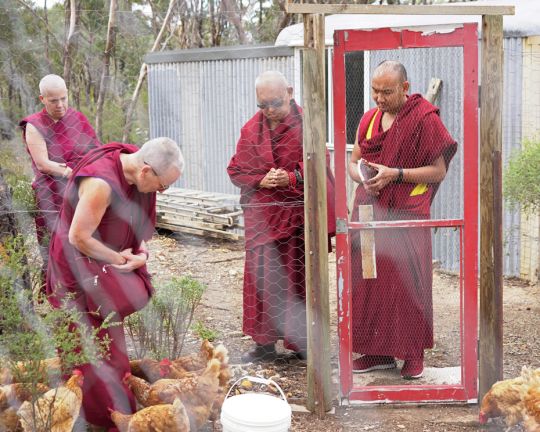
Lama Zopa Rinpoche blessing chickens at Thubten Shedrup Ling Monastery, Bendigo, Australia, April 2018. Photo by Ven. Lobsang Sherab.
During the 2018 retreat in Australia, Lama Zopa Rinpoche was asked, “What is the best way to develop bodhichitta?” You can read Rinpoche’s response in this excerpt from the teaching and in the following video clip.
Many people think there must be some other way to develop bodhichitta. There must be some other way, not lamrim. There must be something special. Not lamrim, not lamrim! Something fantastic! Some other way.
I say “renunciation.” My answer is “renunciation.” The more strongly you see your own suffering in samsara, then when you think of others, you have stronger compassion. You feel others’ suffering in samsara. Then also you have loving kindness for others. You want others to have happiness. And then you have stronger compassion for others to be free from samsara.
For one to do that by oneself—to free all sentient beings from samsara and bring to buddhahood—one has to achieve enlightenment. To do that by oneself alone, then one has to achieve enlightenment. So how strong one’s bodhichitta is depends on the foundation—strong renunciation, strong compassion. When they are strong, then there is strong bodhichitta.
In this southern continent there are all kinds of happiness, but there are all kinds of suffering. There is so much suffering that you can see, you can hear, so much in the world.
The other worlds are not like that. Like the northern continent where everybody lives for one thousand years, nobody is poor, everybody is unbelievably wealthy. Everybody lives for one thousand years. So like that it is very difficult to get renunciation of samsara, so difficult to achieve compassion and bodhichitta.
Here in this world it is much easier. You can see so much suffering. You can feel your own suffering of samsara more strongly. Then it is so easy to develop compassion and so easy to develop bodhichitta.
It is said in Tibetan that due to karma, strong karma, it is easy to generate strong bodhichitta. So we are incredibly fortunate to be born in this time in the southern continent. We are so fortunate because of that. That makes it easy to achieve enlightenment.
Watch Rinpoche teach on “The Best Way to Develop Bodhichitta”:
https://youtu.be/ofZX77L7vnY
Colophon: Excerpted from Lama Zopa Rinpoche’s teachings at the Great Stupa of Universal Compassion, Bendigo, Victoria, Australia, April 10, 2018. Simultaneously transcribed by Ven. Joan Nicell. Lightly edited by Laura Miller, March 2019.
Find complete videos of Lama Zopa Rinpoche’s recent teachings:
https://fpmt.org/media/streaming/teachings-of-lama-zopa-rinpoche/
Lama Zopa Rinpoche is the spiritual director of the Foundation for the Preservation of Mahayana Tradition (FPMT), a Tibetan Buddhist organization dedicated to the transmission of the Mahayana Buddhist tradition and values worldwide through teaching, meditation and community service.
- Tagged: bodhichitta, essential extract, lama zopa rinpoche, lamrim, practical advice, renunciation, video
22
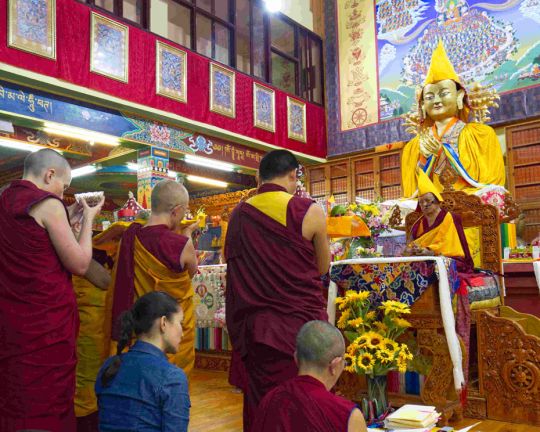
Tsog offering during Lama Chopa, Tushita Meditation Centre, Dharamsala, India, September 2018. Photo by Simon Houlton.
Lama Zopa Rinpoche received a question from a student who was experiencing many obstacles to Dharma practice. In addition to doing the practice of the Thirty-Five Buddhas of Confession and Vajrasattva practice, Rinpoche advised doing mandala offerings:
… Yes, there are some people who have many obstacles when listening to teachings, and when they don’t meditate, then nothing happens. For some people it is like this, and it means there is an obstacle to practice.
It is also very good to do mandala offerings. The mandala offering is very important and at the end of Jorcho preliminary practice, when you make the mandala offering, make a request for the three great purposes.
SPECIAL REQUEST FOR THE THREE GREAT PURPOSES
I prostrate and go for refuge to the guru and the Three Rare Sublime Ones: please bless my mind.
Please bless me and all mother sentient beings to immediately cease all the wrong concepts from disrespect to the spiritual friend up to the subtle dual appearances of the white appearance, red increase, and dark near attainment.
Please bless us to immediately generate all the right realizations from respect for the spiritual friend up to the unification of no more learning.
Please bless us to immediately pacify all outer and inner obstacles. (3x)
The first request is to pacify all the wrong concepts up to subtle dual view of the white, red, and dark visions, next is to generate all the correct realizations from guru devotion up to enlightenment, and the third request is to pacify the outer and inner obstacles.
Outer obstacles are, for example, when you don’t have freedom and you are told by the king, the government or your parents to do something else, like go into the army or kill others, especially to engage in negative karma. Inner obstacles are diseases and also the delusions. Therefore, doing mandala offerings is very important in your life. Then dedicate the mandala. You have to visualize according to the commentary, that is best, and then you collect unbelievable, unbelievable merits, and you dedicate that merit to achieve these three things. That is very, very important, otherwise if you don’t do that, nothing changes.
You should think these obstacles are good and that they arise because of the benefits of practicing Dharma. Think you are experiencing the past karma now; that your past negative karma is finishing. That is a good thing, it is the benefit of practicing Dharma. It is a good thing.
It is very important if you can think that whatever problem you have, you are experiencing that problem for numberless sentient beings. You are experiencing all the suffering and the cause of the suffering—the delusions and karma—for sentient beings, so you receive that from them and then they achieve dharmakaya. This is unbelievable, unbelievable, most unbelievable purification and a quick way to achieve enlightenment. It’s a quick way to enlighten sentient beings, for them to achieve enlightenment. So mostly take the suffering.
Also give your body as a wish-granting jewel, as numberless, so make charity to all those six-realm sentient beings. Then give your possessions and all your past, present, and future merits to numberless sentient beings, so they receive all the happiness. They receive the happiness of this life and of future lives, and ultimate happiness, liberation from samsara, peerless happiness, enlightenment, so they receive everything. Then rejoice. When you give your body, possessions, and merits as a wish-granting jewel, then everything becomes wish-fulfilling for all the sentient beings. The main thing is that they achieve all that happiness, liberation, and enlightenment.
It is very good to do this as much as possible—taking other sentient beings’ sufferings and giving your happiness, your merits etc., to others. It is so good. Spend more time taking others’ sufferings, experiencing the suffering of others, the numberless sentient beings.
This can change your karma. It is a most unbelievable, most unbelievable way to collect merit and a quick way to achieve enlightenment for sentient beings. This is most powerful purification, and it can change your karma the more you do it.
Read Rinpoche’s complete advice “Purifying Obstacles to Dharma Practice,” posted on the Lama Yeshe Wisdom Archive website in January 2019:
https://www.lamayeshe.com/advice/purifying-obstacles-dharma-practice-0
The FPMT Foundation Store makes available the Lama Chopa Jorcho practice book and commentary by Lama Zopa Rinpoche on this heart practice:
https://shop.fpmt.org/search.asp?keyword=jorcho&search=
Lama Zopa Rinpoche is the spiritual director of the Foundation for the Preservation of Mahayana Tradition (FPMT), a Tibetan Buddhist organization dedicated to the transmission of the Mahayana Buddhist tradition and values worldwide through teaching, meditation and community service.
- Tagged: jorcho, lama chopa, lama zopa rinpoche, purification practice
18
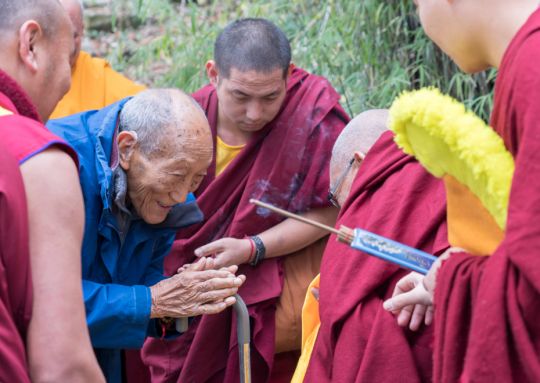
Lama Zopa Rinpoche greeting Khyongla Rato Rinpoche, who is 97 years old, before the long life puja offered to him at Tushita Meditation Centre, Dharamsala, India, February 2019. Photo by Ven. Lobsang Sherab.
During the 2018 retreat in Australia, Lama Zopa Rinpoche gave advice on the main activities to actualize the lamrim. Here is a small excerpt from this teaching:
Lama Tsongkhapa asked Manjushri, “What is the quick way to actualize the lamrim path?”
Manjushri answered, “Three things need to be done. Collecting merits and purification is the first.”
The usual thing is purification by Vajrasattva and so forth, but Vajrasattva is not the only one; there is Samayavajra in particular for the negative karma collected with the guru. But, as I mentioned, the most powerful is what the guru said to do, [to follow] the guru’s wishes, to do that. Pleasing the guru, as I mentioned, is the most powerful way to purify negative karmas and defilements, purifying the obstacles to realizing the path to enlightenment.
Then, with compassion, with a sincere heart, doing hard work for sentient beings, like the bodhisattvas, doing hard work for sentient beings and doing hard work for the Sangha with a sincere mind, with devotion, a sincere mind. Those are the most powerful—as I mentioned yesterday, following the guru’s advice, pleasing the guru’s holy mind, as I mentioned the other night.
Of course, Vajrasattva is known in all the four sects. It is common, but you don’t have to think only of Vajrasattva, “Oh, I need to do three months Vajrasattva,” to have the conditions for that. No, there are so many ways to purify.
As I told the stories the other night, things can change in a minute. In a minute your life, the whole thing, can change—a higher rebirth or lower realms—so then collecting merits. Again the same thing: mandala offering is very common in all four sects, mandala offering with clear meditation. Yes, but of course, again fulfilling the guru’s wishes, pleasing the guru, is, again, collecting the highest merits. Now here it is similar. …
Watch Lama Zopa Rinpoche teach on “Three Main Activities to Actualize Lamrim which Are Found in Lama Chopa”:
https://youtu.be/BsfMxCZxEAE
Colophon: Excerpted from Lama Zopa Rinpoche’s teachings at the Great Stupa of Universal Compassion, Bendigo, Victoria, Australia, April 10, 2018. Simultaneously transcribed by Ven. Joan Nicell. Lightly edited by Laura Miller, March 2019.
Find complete videos of Lama Zopa Rinpoche’s recent teachings:
https://fpmt.org/media/streaming/teachings-of-lama-zopa-rinpoche/
Lama Zopa Rinpoche is the spiritual director of the Foundation for the Preservation of Mahayana Tradition (FPMT), a Tibetan Buddhist organization dedicated to the transmission of the Mahayana Buddhist tradition and values worldwide through teaching, meditation and community service.
- Tagged: essential extract, guru, lama zopa rinpoche, lamrim, merit, practice, purification, video
11
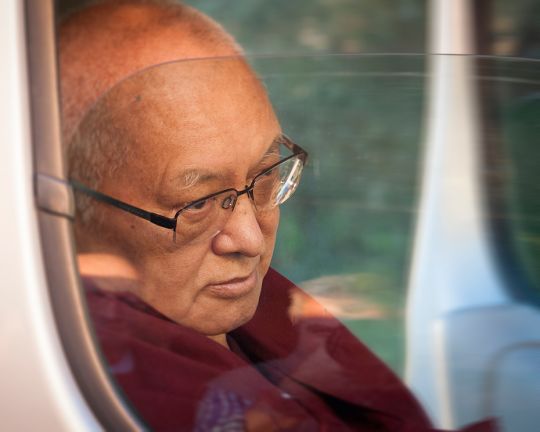
Lama Zopa Rinpoche arriving at the teaching venue during the 100 Million Mani Retreat at Istituto Lama Tzong Khapa, Italy, October 2017. Photo by Piero Sirianni.
During a teaching given at the 2017 100 Million Mani Retreat held at Istituto Lama Tzong Khapa, Italy, Lama Zopa Rinpoche explains how we incorrectly see things.
In the text it says that rabrib, or defective view, is like when you have a vision of hair falling down while you are eating food. There is no hair falling down, but you have a vision of that. It is like when you close your eyes—not totally close them, but close them a little bit when the sun is shining—and [it appears as if] there is all kinds of hair going around. So it is the same for rabrib. It appears to you, but it is not there. So that is the example.
The I, action, object, six sense objects, forms, sounds, smells, tastes, tangible objects, senses, everything, even though it is merely labeled by the mind, it doesn’t appear to me or to you, it doesn’t appear as it is—merely labeled by the mind. Right now, it is merely labeled by the mind. Right before this second, it was merely labeled by the mind. But when it appeared to you, it appears from its own side, existing from its own side, as the real one.
Everything—I, action, object, hell and enlightenment, sense objects, senses—as the Heart Sutra says, all that—elements, the four noble truths, the twelve links—so the real one appearing from there, never came from your mind, nothing to do with your mind. Not merely labeled by the mind, not even came from your mind, just from there. Do you understand what I’m saying? It is a total hallucination. It is decorated, projected there by the ignorance.
It is exactly the same as the hallucinated rabrib. It appeared real, but it is not there. What appeared real to you, what you one hundred percent believe, is not there. This is the same, your daily life—your car, your house, Lama Tzong Khapa Institute—what you see as real is not there.
It is the same as rabrib, as I described—what you see with eyes not completely closed, then you see all these things—but it is not there. It is like when you don’t recognize a dream as a dream. You believe it is real. You see a mirage, you believe the mirage is water, but there is no water. You understand?
While you are walking—real trees, real sky, real road, real pizza—all this, everything is rabrib. You have to meditate like that. You have to practice awareness. …
Watch more from Lama Zopa Rinpoche’s teaching on the defective view in this video clip:
https://youtu.be/9BmWT0nDIQc
Colonphon: Excerpted from Lama Zopa Rinpoche’s teaching at Istituto Lama Tzong Khapa, Italy, October 13, 2017. Simultaneously transcribed by Ven. Joan Nicell. Edited by Nicole Parisi-Smith and Laura Miller, August 2018.
Find complete videos of Lama Zopa Rinpoche’s recent teachings:
https://fpmt.org/media/streaming/teachings-of-lama-zopa-rinpoche/
Lama Zopa Rinpoche is the spiritual director of the Foundation for the Preservation of Mahayana Tradition (FPMT), a Tibetan Buddhist organization dedicated to the transmission of the Mahayana Buddhist tradition and values worldwide through teaching, meditation, and community service.
- Tagged: advice from lama zopa rinpoche, emptiness, essential extract, lama zopa rinpoche, madhyamaka, practical advice, video
8
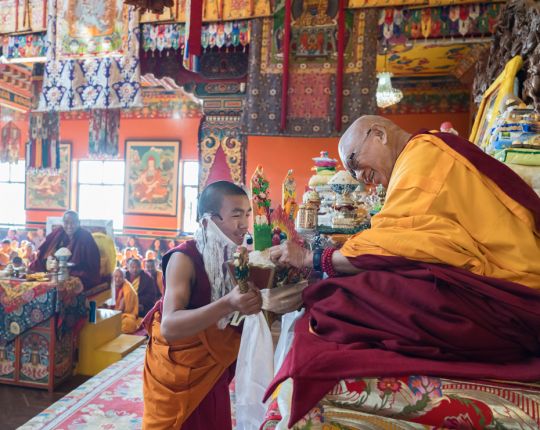
Lama Zopa Rinpoche during a puja on Losar, Kopan Monastery, February 2019. Photo by Ven. Lobsang Sherab.
Advice from Lama Zopa Rinpoche on what to think anytime you are doing a puja:
When doing any puja, you can think, “I am doing this puja for any sentient being who needs this puja.” So motivate for everyone, not for your work or for yourself, and not for money. Then doing the puja becomes Dharma, because of the pure motivation, because of your thought to benefit others.
Then also dedicate for people who are dying or sick, or for anyone who needs it. So all those people who are in so much need for prayers, the puja is for all of them. Whatever you do, try to benefit sentient beings, not just recite prayers.
The whole Buddha Dharma comes to this: to not harm others, and then to benefit others. Just having the mere thought to benefit someone is better than making offerings to numberless Buddhas.
If you follow the mind, which is unsubdued, that harms you and harms numberless sentient beings from life to life. If you practice the good heart, then it only benefits you from life to life.
How do the Kadampa Geshes practice the holy Dharma? They give up their lives for numberless sentient beings, thinking about what is the best for sentient beings. So even when facing sickness or death, think about whatever is of most benefit for sentient beings.
Colophon: Scribed by Ven. Holly Ansett, US, March 2018. Lightly edited by Laura Miller.
See new photos of Lama Zopa Rinpoche in Nepal and India. Find all photo albums of Rinpoche:
https://fpmt.org/teachers/zopa/gallery/
Find complete videos of Lama Zopa Rinpoche’s recent teachings:
https://fpmt.org/media/streaming/teachings-of-lama-zopa-rinpoche/
Lama Zopa Rinpoche is the spiritual director of the Foundation for the Preservation of Mahayana Tradition (FPMT), a Tibetan Buddhist organization dedicated to the transmission of the Mahayana Buddhist tradition and values worldwide through teaching, meditation, and community service.
- Tagged: lama zopa rinpoche, practice, puja
4
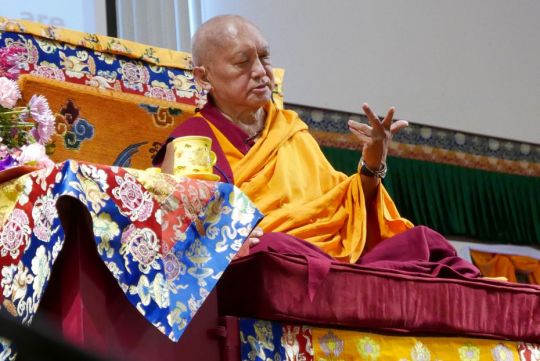
Lama Zopa Rinpoche teaching at the Light of the Path 2016 retreat, Black Mountain, North Carolina, US, August 2016. Photo by Ven. Roger Kunsang.
In August 2016, during the Light of the Path retreat, Lama Zopa Rinpoche advised students to check carefully when meditating on emptiness.
When many people meditate on emptiness they say that nothing exists. Do you understand? Nothing exists. [When you do that] you are not meditating on emptiness. You are meditating that things don’t exist even in mere name, doesn’t exist, nothing, doesn’t exist. Sorry to say this.
I’m sure I do that a lot. I think I do that a lot if I don’t check well. I think when I meditate I do that normal mistake: even in mere name doesn’t exist, complete nihilism, emptiness meditation that is nihilism. You understand?
Remember this: when you meditate on emptiness check to see whether you are meditating on nihilism or not. Make sure. Keep it in mind. Write it down.
This is a suggestion bringing up my own mistakes. Whether it is really meditating on emptiness, whether meditating on nihilism or not, you have to check.
The Prasangika view of emptiness has to be unified with dependent arising. Dependent arising has to be unified with emptiness. That is the Prasangika view of emptiness, the right view, of renunciation, bodhichitta, and emptiness; it is the right view. …
Watch more of Lama Zopa Rinpoche’s advice on meditating on emptiness in this video clip:
https://youtu.be/NGvh-62rWh4
Colonphon: Excerpted from Lama Zopa Rinpoche’s teachings at Light of the Path 2016 retreat, Black Mountain, North Carolina, US, August 16, 2016. Simultaneously transcribed by Ven. Joan Nicell. Edited by Nicole Parisi-Smith and Laura Miller, August 2018.
Find complete videos of Lama Zopa Rinpoche’s recent teachings:
https://fpmt.org/media/streaming/teachings-of-lama-zopa-rinpoche/
Lama Zopa Rinpoche is the spiritual director of the Foundation for the Preservation of Mahayana Tradition (FPMT), a Tibetan Buddhist organization dedicated to the transmission of the Mahayana Buddhist tradition and values worldwide through teaching, meditation, and community service.
25
How to Find a Guru
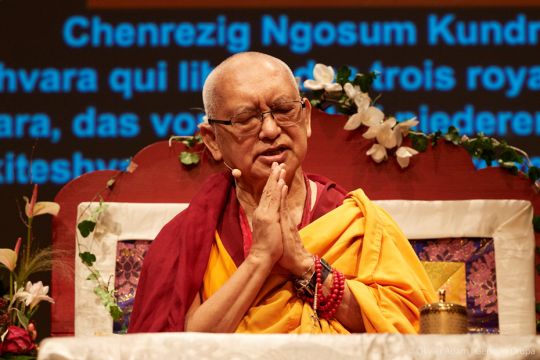
Lama Zopa Rinpoche at teachings organized by Gendun Drupa Center, Martigny, Switzerland, November 2018. Photo by Olivier Adam.
During the 2018 retreat in Australia, Lama Zopa Rinpoche explained how to find a guru, captured in this excerpt and video clip:
As I mentioned, even if you don’t have a guru but study, at least a short teaching, Liberation in the Palm of Your Hand, it’s so clear. That is so important. Then you know what you have to do if you want to follow a guru, if you want to practice. Then you know what to do.
Otherwise it is like looking for a boyfriend or girlfriend. You do the same thing—you make looking for a guru like looking for boyfriend or girlfriend. You do some teachings or initiation, then if you don’t like it, you give up, you throw out—not in the garbage, you can’t do that—but it is like that. Then you do it many times like that in this life.
You’re basically following people you know, they guide you, “Go to this lama, go to that lama.” Then another lama comes along. You don’t know how to practice. You don’t try to study. You don’t know that there is something to study. It’s just a very short time. Then another lama comes, just short time, comes and goes, disappears in the sky, ha-ha. Kind of like that. …
So you must read and study. Generally, people don’t know there is something to study, that there is something to read. They don’t know that. Maybe other people don’t tell, so you don’t know. So it is like that.
If you read, then you know whether you can [have them as your guru] or not. Then you see. All the benefits you come to know and all the shortcomings if you make mistakes. You have to be careful, most careful.
Last night I mentioned that just being famous, or just because the guru has many disciples, that alone that doesn’t mean [that you should have them as your guru]. In the West and in Chinese countries, they are very attracted to that, very attracted. Immediately you follow that. Then one without reputation, without many disciples, you give up. Then one with many disciples, very famous, you follow. It is kind of like that.
Many people are like that, because they don’t understand Dharma. Also I’m not saying everyone like that you can’t trust. I’m not saying that. But that alone is not the reason that you can trust them.
Kyabje Zong Rinpoche used to say, “If they are famous, they should be famous in the monasteries,” not just in the West, but famous in the monasteries—Tibetan monasteries, large monasteries. Nyingma and Kagyu have large monasteries. Gelug has Sera, Ganden, Drepung. That many people there trust them, it should be like that.
That is what Kyabje Zong Rinpoche said. He was one lama from who I received many teachings. He was Lama Yeshe’s guru as well. Kyabe Zong Rinpoche himself, and of course many others like him, were very famous in the monasteries. And now many people have known them for many years. That you can understand.
But even in the monasteries, there are many lamas and geshes with many thousands of disciples, so learned in philosophy, still it doesn’t mean you should make a connection with them as a guru immediately to receive teachings and initiations.
Watch the complete teaching “How to Find the Guru” from Lama Zopa Rinpoche:
https://youtu.be/VL5_XcvnPVI
Colophon: Excerpted from Lama Zopa Rinpoche’s teachings at the Great Stupa of Universal Compassion, Bendigo, Victoria, Australia, April 19, 2018. Simultaneously transcribed by Ven. Joan Nicell. Lightly edited by Laura Miller, February 2019.
Find complete videos of Lama Zopa Rinpoche’s recent teachings:
https://fpmt.org/media/streaming/teachings-of-lama-zopa-rinpoche/
Lama Zopa Rinpoche is the spiritual director of the Foundation for the Preservation of Mahayana Tradition (FPMT), a Tibetan Buddhist organization dedicated to the transmission of the Mahayana Buddhist tradition and values worldwide through teaching, meditation and community service.
- Tagged: essential extract, guru, lama zopa rinpoche, practice, video
- Home
- News/Media
- Study & Practice
- About FPMT Education Services
- Latest News
- Programs
- New to Buddhism?
- Buddhist Mind Science: Activating Your Potential
- Heart Advice for Death and Dying
- Discovering Buddhism
- Living in the Path
- Exploring Buddhism
- FPMT Basic Program
- FPMT Masters Program
- FPMT In-Depth Meditation Training
- Maitripa College
- Lotsawa Rinchen Zangpo Translator Program
- Universal Education for Compassion & Wisdom
- Online Learning Center
- Prayers & Practice Materials
- Overview of Prayers & Practices
- Full Catalogue of Prayers & Practice Materials
- Explore Popular Topics
- Benefiting Animals
- Chenrezig Resources
- Death & Dying Resources
- Lama Chopa (Guru Puja)
- Lama Zopa Rinpoche: Compendium of Precious Instructions
- Lama Zopa Rinpoche: Life Practice Advice
- Lama Zopa Rinpoche Practice Series
- Lamrim Resources
- Mantras
- Prayer Book Updates
- Purification Practices
- Sutras
- Thought Transformation (Lojong)
- Audio Materials
- Dharma Dates – Tibetan Calendar
- Translation Services
- Publishing Services
- Teachings and Advice
- Find Teachings and Advice
- Lama Zopa Rinpoche Advice Page
- Lama Zopa Rinpoche: Compendium of Precious Instructions
- Lama Zopa Rinpoche Video Teachings
- ༧སྐྱབས་རྗེ་བཟོད་པ་རིན་པོ་ཆེ་མཆོག་ནས་སྩལ་བའི་བཀའ་སློབ་བརྙན་འཕྲིན།
- Podcasts
- Lama Yeshe Wisdom Archive
- Buddhism FAQ
- Dharma for Young People
- Resources on Holy Objects
- Ways to Offer Support
- Centers
- Affiliates Area
- Teachers
- Projects
- Charitable Projects
- Make a Donation
- Applying for Grants
- News about Projects
- Other Projects within FPMT
- Support International Office
- Projects Photo Galleries
- Give Where Most Needed
- FPMT
- Shop
Translate*
*powered by Google TranslateTranslation of pages on fpmt.org is performed by Google Translate, a third party service which FPMT has no control over. The service provides automated computer translations that are only an approximation of the websites' original content. The translations should not be considered exact and only used as a rough guide.Unlike an external enemy, the inner enemy cannot regroup and launch a comeback once it has been destroyed from within.







